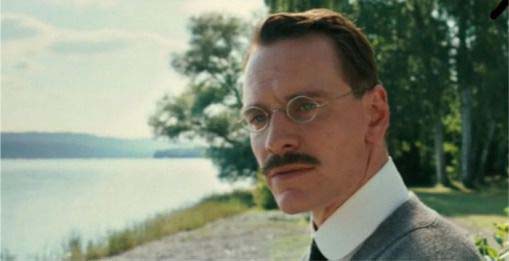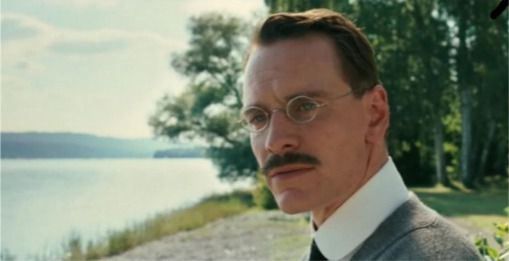Jung Freud Individual Therapy & Major Life Transitions 2


My first post on “A Dangerous Method” looked into the depths of the film to see what it could teach us both about the nature of individual therapy and the psychological character of major life transitions. This post looks at two other insights that the film offers about major life transitions and the nature of the individuation process. Both are in the latter part of the film, where, for a time, Jung the healer becomes one who is himself in need of healing.
Here are two further important aspects of Jung’s psychological development portrayed in the film.
3. Often Growth is Preceded by Depression
At the end of the film, in his last encounter with Sabina Spielrein, we become aware that Jung is suffering from acute depression. What the film only explores in a cursory way, though, is the way in which this experience of depression and going into the depths of the “night sea journey” eventually leads Jung to a closer and different relationship to himself, the discovery of hitherto unknown parts of his psyche, and eventually to the development of what we know today as his unique psychological perspective.
Jung’s experience highlights an important truth. Depression involves a submergence of the person into his or her unconscious depths. But if we can have the courage to go into our depression as Jung did, we often find that it contains within it the very things that the soul needs for its renewal.
4. Everyone Needs an Individual Way Forward
The film ends at the very beginning of a vital stage in Jung’s personal journey. He has broken with Freud, and ended the relationship with Spielrein. Implied, but not stated, is that the next few years of Jung’s life will involve an inward journey of the most profound kind, that will ultimately be chronicled in his great Red Book, and, later in his autobiography, Memories, Dreams and Reflections.

This aspect of Jung’s journey sheds much light on each of our individual journeys. For when we are confronted with the profoundest types of crisis in our lives, only an individual answer will suffice, as Jung came to know well. There is a definite type of crisis that is only resolved by a very individual encounter with the unconscious, and within it, the as yet undiscovered aspects of the self.
Wishing you every good thing on your own individual journey to wholeness,
[cta]
PHOTOS: © All rights reserved Sony Pictures Classics 2011


jamenta
I wish the film had explored this critical juncture of Jung’s life -and considering the type of audience it probably attracted – an additional hour I think would not have harmed ticket sales – and would have enhanced the film. Perhaps they stopped due to financial constraints – I don’t know.
I did at first think the film lacked any focus on Jung’s teleological approach to therapy. But then – thinking more about how he treated Spielrein in the film – fostering her desire to become a doctor and eventually a psychotherapist – despite her obvious psychosis in the beginning – I suppose cinematically – that did to some degree represent his approach.
Also – given the scope of Jung’s work, it does seem unfair to criticize a film that fails to cover it all. It would seem to me that one of the central themes of ADM – was the actual affair itself – and the psychological implications … i.e. some of the ambiguity – the kind of ambiguity that arises when one begins integrating the shadow portions of one’s personality.
This kind of openness and not to be too morally judgemental of the psyche – is admittedly – at least to some degree – important in regards to the exploration of the unconscious.
It makes me feel I need to see the film again. I do wish there was more about dreams in the film – since it was so fundamental to both Freud & Jung. Dream interpretation & how the dreams are used to guide both the patient and the therapist in regards to treatment. This seemed missing for me in the film – but perhaps I simply missed it being focused on other aspects.
Surprisingly – I actually heard someone in the theater – where I was watching the movie – cheer when Freud accused Jung of Mysticism and creating just another illusion for people to believe in.
I also think the focus on sexuality was definitely problematic for Jung – but the real core of Jung’s problem with Freud was the mechanistic/reductive thinking – that led Freud to some outlandish (IMO) theories about the ancient past.
Also – it truly is difficult to sometimes accept that our psyches do have content that are forward looking. It takes a pretty large leap (one Jung was willing to make) to jump that reductive/mechanistic cause and effect mindset. A leap – that I think a good deal of mainstream psychology has yet to really make.
Even I personally have to make – despite all the evidence to the contrary.
Thanks for the BLOG post Brian. Excellent as always.
Brian C
THank you for your comment, John. I certainly agree with you that there would be real value in seeing this film more than once: there is certainly a huge amount going on in it.
I certainly hear what you’re saying about the film having a real lack of emphasis on many of the more distinctive aspects of Jung’s approach to analysis. In fairness to Cronenbourg and company, I think that it has to be acknowledged that the film’s focus is on a fairly early stage in Jung’s unfolding as a psychotherapeutic thinker. Those of us who are more familiar and enthusiastic about what Jung’s approach brings could wish that the film went further into his development. I guess, though, that the film is quite focussed on the dramatic action inherent in the Jung-Freud-Spielrein dynamic, and so we can’t expect a full exposition of Jung’s views.
I did think that one of the most important aspects of the film was its treatment of Jung’s positive regard for Spielrein, and his optimism about her as a person. I think that this attitude was a genuine characteristic of Jung at his best, and it is one of the things that made him such a compelling analyst. It was I guess teleological in that it certainly demonstrated Jung’s concern with what was trying to emerge in Spielrein’s life, although, as we know, Jung is going to have a great deal more to contribute in this area as his thought evolves.
I would have to agree with you that Freud’s emphasis on the mechanistic and reductionist approaches is one of the key things that finally led to their parting of ways. That, and the whole dimension opened up in the movie of Freud’s extreme protectiveness of his authority.
A shame to see two such geniuses part ways, but maybe it was essential for them to do so, so that each could fulfil his own destiny.
THanks once again for all your thoughts, John.